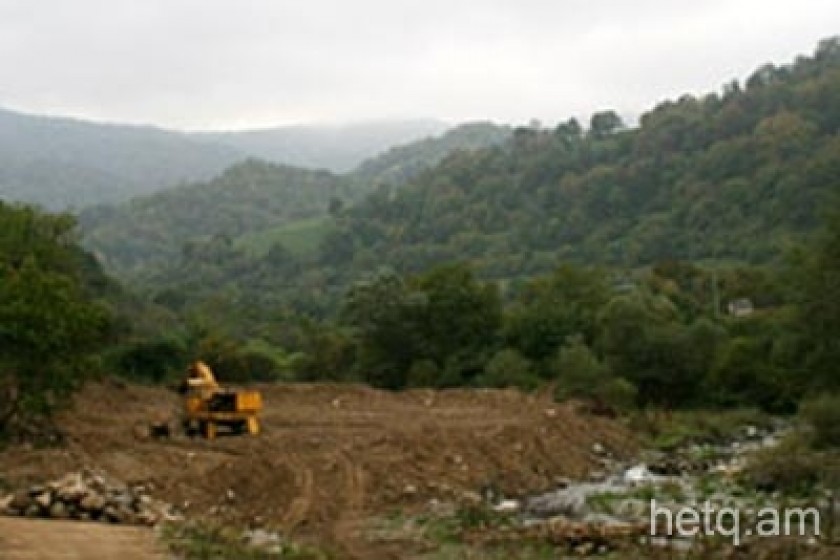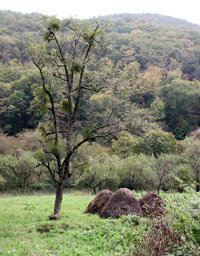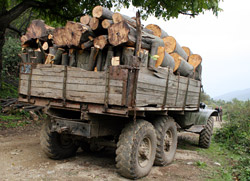
Illegal Logging in Lori
On April 6, 2006 Armen Sargsyan a young resident of the village of Arevatsag village in the Lori Marz saw that there was no firewood at home, so he and his cousins Samvel and Manvel harnessed their horse, took an axe and a two-man saw and went to collect firewood from the side roads of Arevatsag and the neighboring Mgart.
What happened next was something out of Unlucky Panos, the Armenian folktale. Their cart broke down. Samvel went about fixing it, while Armen and Manvel collected the firewood. Not satisfied with what they had gathered, Armen saw two withered trees on the roadside and suggested cutting them down, too. They chopped down the trees, cut them up and loaded them on the cart, and headed back to the village. Little did they know that the withered trees they had cut down were pear trees registered in the Armenian Red Book, or what sufferings to their poor family that 0.8 cubic meters would bring.
The police stopped their cart as soon as they entered the village, and several days later the Lori Marz Prosecutor's Office instituted legal proceedings against unlucky woodcutters, charging them of violating Article 296, Section 2 and Section 3, Paragraphs 3 and 4 of the Criminal Code of the Republic of Armenia by cutting two pear-trees of 22 and 24 centimeters in diameter respectively, costing the Republic of Armenia a total of 445,000 drams in lost property.
The Court of First Instance of the Lori Marz, Judge Ani Mkhitaryan presiding, heard the case on September 20, 2006 and fined Manvel Davtyan and Armen Sarkissyan 448,600 drams. The law enforcement agency took an inventory of Armen Sarkissyan's house, and his property was immediately seized.
“Our TV was sold at auction for 25,000 drams; the rest – the wardrobe, dresser, and several iron beds—were useless. We have 1,500 hectares of land, but we can't cultivate it. We have a nine-year land tax debt. If only they don't take our plot! My son will grow up and cultivate that land and take care of u,” said Armen's mother Rima Sarkissyan in distress.
The forests of the Tumanyan region of the Lori Marz, which represent about 48% of the total Armenian forestation, have been cut down illegally and plundered for many years now. The two pear trees are a drop in the bucket, but the prosecutor's office is too weak to fight against the large-scale loggers, so it tries to compensate for state losses at the expense of the poor and miserable.
Two of the three forests in the Tumanyan region have been for many years managed by relatives of the regional governor, or marzpet, Henrik Kochinyan. Kochinyan's brother Hovhannes Kochinyan has been the director of the Jiliza Forestry Subsidiary JSC since 2003, and his brother-in-law Kamo Shahnzaryan has been the director of the Lalvar Forestry Subsidiary JSC since before that.
These years have been marked by evident logging around Hanki Dzor (Mine Gorge) near Shamlug in the Jiliza area, in forests covering the entire area between the cattle farm on the Shamlug-Chochkan road and the village of Chochkan, in all the forests along the Shamlug-Jiliza road, in the deciduous forests around the village of Tsaghkashat village and in the forested Jivank pastures, which belong to the Tsaghkashat community.
 Furthermore, if we take into account that the forests that used to extend from the site called Atoi Dacha (Ato's Summer House) to the village of Teghut now look more like a hayfield and the forests on the road to Mount Karakotuk are now little more than a memory, having being completely wiped out at the hands of the mayor of the village of Shnokh, Haykaz Kochinyan, another Kochinyan brother, it becomes clear that Marzpet Henrik Kochinyan remains in firm control of the local wood mafia.
Furthermore, if we take into account that the forests that used to extend from the site called Atoi Dacha (Ato's Summer House) to the village of Teghut now look more like a hayfield and the forests on the road to Mount Karakotuk are now little more than a memory, having being completely wiped out at the hands of the mayor of the village of Shnokh, Haykaz Kochinyan, another Kochinyan brother, it becomes clear that Marzpet Henrik Kochinyan remains in firm control of the local wood mafia.
We saw this truck loaded with wood in the forest of Teghut village. The truck had no license plate. Lumberjacks were conducting so-called sanitary logging at two different sites in the forest, cutting down the best trees.
And no one knows how many thousands of valuable trees registered in the Armenian Red Book have disappeared in those brutally destroyed forests.
It appears that the state has suffered no losses and the prosecutor's office of the Lori Marz has made no serious effort to recover those losses, and only minor criminal cases have been instituted against a few minor officials in the forestry system, as though the high-ranking officials know nothing about the illegal logging.
The people of Alaverdi learned seven months ago that Hovhannes Kochinyan had been dismissed from his post for incurring 60 million drams in damages to the state through large scale illegal logging within the area of the Jiliza forests. We were informed by the state nature protection inspection agency that this was true and that documents connected to this case had been sent to the Lori Marz prosecutor's office.
 That the crises in the forest has emerged as a result of patronage is evidenced in a letter sent on May 31, 2005 by the Lori prosecutor to the three directors of three forestry services in the Lori Marz. The letter stated: “The forestry activities that you have managed were not aimed at the preservation of forest resources and prevention of large-scale logging. There has been no control over the quantity, quality, and species diversity of the wood released. High quality construction timber has been taken very often instead of firewood, and valuable tree species are cut under the pretence of sanitary logging. The situation in the Jiliza forests is problematic. The forestries don't fulfill their obligations to the state budget and generate large arrears that are enforceably levied through arbitration.” The prosecutor's letter highlights the poor performance of the Jiliza and Lalvar forestry services.
That the crises in the forest has emerged as a result of patronage is evidenced in a letter sent on May 31, 2005 by the Lori prosecutor to the three directors of three forestry services in the Lori Marz. The letter stated: “The forestry activities that you have managed were not aimed at the preservation of forest resources and prevention of large-scale logging. There has been no control over the quantity, quality, and species diversity of the wood released. High quality construction timber has been taken very often instead of firewood, and valuable tree species are cut under the pretence of sanitary logging. The situation in the Jiliza forests is problematic. The forestries don't fulfill their obligations to the state budget and generate large arrears that are enforceably levied through arbitration.” The prosecutor's letter highlights the poor performance of the Jiliza and Lalvar forestry services.
But the prosecutor's office seems to be content with letters that yield no results. Artush Boshyan, head of the Tumanyan region's Department of Internal Affairs and godson of Henrik Kochinyan, was very cautious on the subject of illegal logging in Lori. He passed us an unsigned document through one of his clerks. Ten cases of logging were detected in 2004, seventeen cases in 2005, and another seventeen during the first eight months of 2006. The trees were cut down by people who live in the area.
 Videos
Videos Photos
Photos




Write a comment